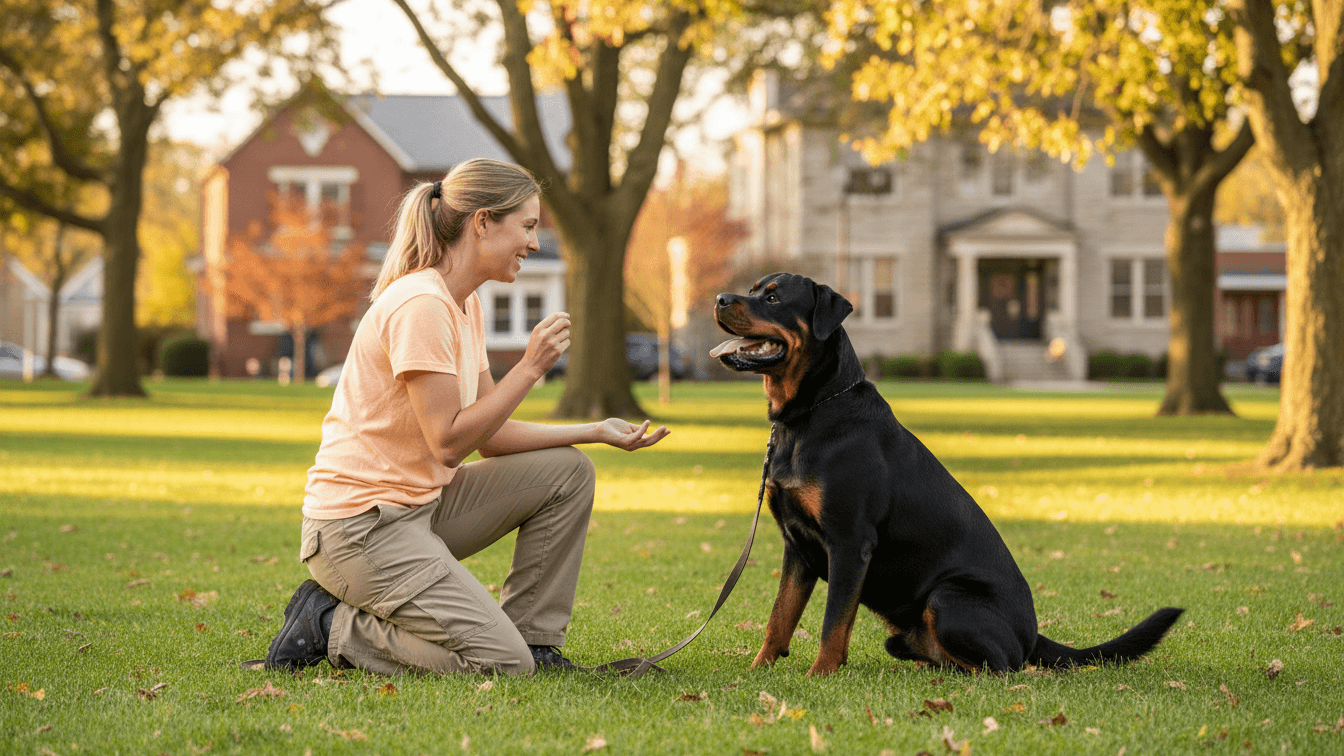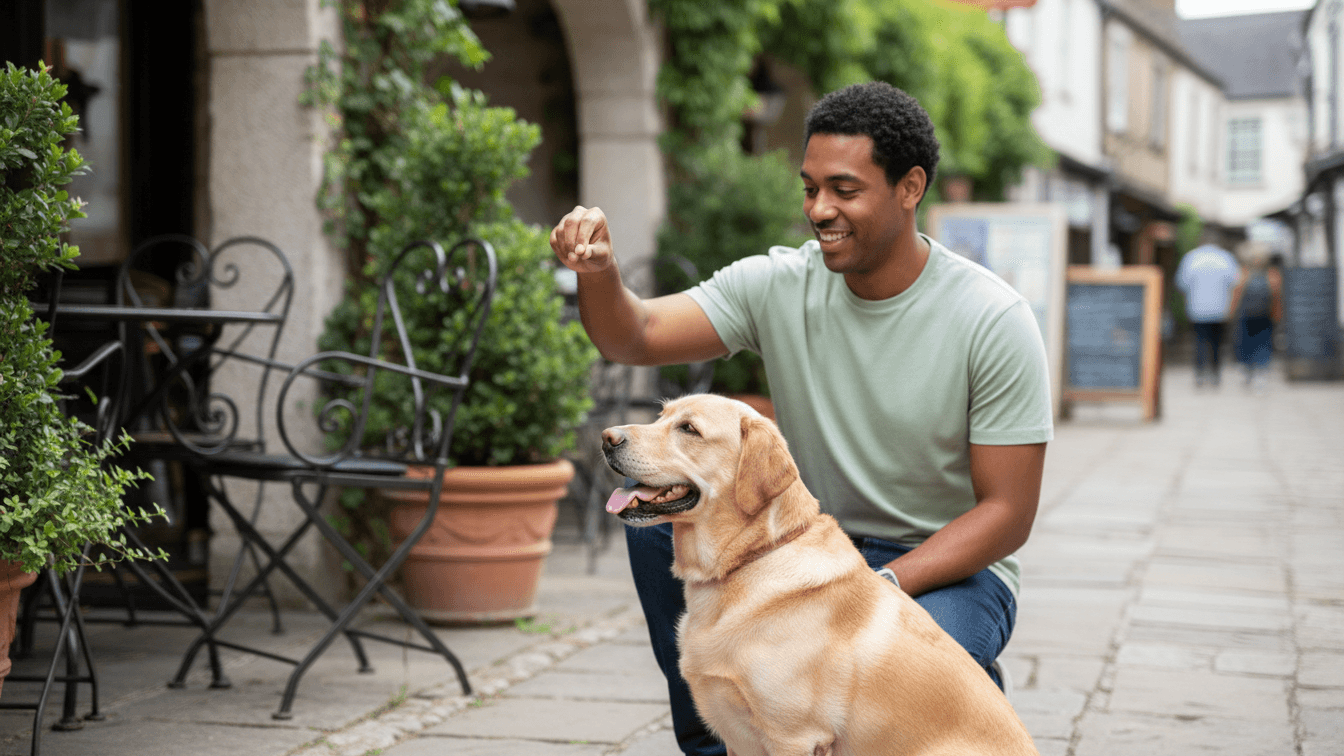Your Complete Guide to Choosing a Dog Trainer in De Soto and Surrounding Areas
Living with a dog in De Soto means you need a companion who can handle walks through quiet residential streets, visits to nearby recreation areas, and interactions with neighbors in this tight-knit Jackson County community. Your dog should feel comfortable on leash through town and stay calm when meeting other dogs and people at local gathering spots.
Since De Soto is a small community, you’ll likely work with trainers who serve Jackson County and the broader southern Illinois region. Finding a professional dog trainer who understands rural and small-town living makes all the difference when you’re building real-world skills your dog will actually use.
How to Choose the Right Trainer
Start by looking for someone who uses positive reinforcement training and understands what life looks like in a small Illinois town. Your dog needs to walk politely past neighbors, stay calm during car rides to nearby Carbondale or Murphysboro, and handle occasional wildlife sightings without losing focus.
Credentials help you compare trainers quickly and find someone with proven expertise. Look for dog trainer certifications like CPDT-KA, KPA-CTP, or IAABC-CDBC for behavior concerns. If your dog shows serious aggression or fear, ask about CBCC-KA credentials or programs like CTC.
In-home dog training works especially well in De Soto because your trainer can address problems exactly where they happen, from door manners to backyard reactivity. Group classes make sense once your dog can focus around distractions, and they’re usually offered in nearby larger towns.
Private lessons give you one-on-one attention and a customized training program that fits your schedule and goals. Board and train programs can help when you need faster results, but make sure you understand how the trainer will transfer those skills back to you.
Common Dog Training Methods Explained

Reward-based methods create lasting changes while building trust between you and your dog. These approaches also help you follow local ordinances about keeping dogs under control in public spaces.
Basic obedience includes sit, down, stay, recall, and leash training so your dog can handle everyday situations calmly. These skills matter whether you’re walking past the post office or greeting visitors at home.
Puppy training focuses on socialization, potty training, bite inhibition, and crate comfort during those critical early months. Starting young prevents problems from developing and helps your puppy adjust to small-town life where everyone notices a misbehaving dog.
Behavior modification addresses reactivity, separation anxiety, resource guarding, and fear through careful desensitization work. For serious cases, ask if your trainer works with local veterinarians who can rule out medical causes or prescribe medication when needed.
Dog training classes provide structure and help your dog practice good manners around other dogs and people. The best group classes screen participants carefully and keep dogs at a comfortable distance while they’re learning.
Specialized programs like service dog training or therapy dog training require extra precision, public-access skills, and a step-by-step approach that goes beyond basic obedience training.
Avoid trainers who rely on fear, pain, or intimidation. Humane methods are safer for everyone, easier to maintain long-term, and much better for keeping peace with neighbors in a small community where everyone knows each other.
Average Cost of Dog Training in De Soto, IL and Surrounding Areas (Updated for 2025)
Prices in Jackson County and southern Illinois depend on the trainer’s experience, session length, and whether they come to your home. Here’s what most local dog owners are paying in 2025.
| Service Type | Average Cost (Jackson County Area) |
|---|---|
| Puppy classes (4-6 weeks) | $140-$260 total |
| Group obedience classes (4-6 weeks) | $150-$280 total |
| Private lessons (60-90 min) | $100-$175 per session |
| In-home coaching packages (4-6 visits) | $400-$850 total |
| Day training (trainer works your dog) | $425-$900 per week |
| Behavior consult for anxiety/reactivity | $140-$230 |
| Board and train (2-4 weeks) | $1,900-$4,200 total |
Trainers may charge travel fees if they’re coming from Carbondale, Marion, or other nearby cities. Expect higher rates for complex behavior modification work or aggressive dog training.
Make sure you understand what’s included in the total cost, how progress gets measured, and whether the trainer offers a free consultation before you commit.
Questions to Ask a Potential Dog Trainer
- What training methods do you use, and how do you keep training sessions positive and stress-free?
- What credentials do you hold, like CPDT-KSA or KPA-CTP, and how do you stay current with continuing education?
- How will you customize the training program for my dog’s specific needs and our lifestyle in De Soto?
- Do you offer in-home visits, group classes, or day training, and which option fits my goals best?
- How will we track my dog’s progress and know when to add more distractions?
- What are the total costs including travel fees, and what’s your cancellation policy?
- Do you carry liability insurance, and can you provide proof?
- For behavior problems, will you coordinate with my veterinarian if needed?
- What homework should I expect between sessions to help my dog keep improving?
Local De Soto and Jackson County Rules and Considerations
De Soto follows Jackson County ordinances and Illinois state law to keep dogs safe and prevent nuisances. Understanding these rules helps you train your dog to be a good neighbor.
Leash laws apply throughout De Soto and Jackson County. Keep your dog on leash in all public areas unless you’re inside a designated off-leash space. A standard 6-foot leash works best for neighborhood walks and visits to public areas.
Illinois requires current rabies vaccination for all dogs, and you’ll need to keep proof available. Your veterinarian can provide vaccination records and tags.
Excessive barking can lead to nuisance complaints, especially in a small town where sound travels. Work with your trainer on alert barking and separation anxiety before neighbors start calling.
Illinois doesn’t require special licenses for dog trainers. Trainers follow standard business regulations, but if they board dogs for payment, they must comply with the Illinois Department of Agriculture’s Animal Welfare Act requirements.
Jackson County Animal Control handles stray animals, bite reports, and general animal welfare concerns throughout the county including De Soto.
Local De Soto and Surrounding Area Resources for Dog Owners
These spots give you places to practice socialization, work on leash manners, and provide enrichment for your dog. Always follow posted rules and respect other visitors.
- Giant City State Park near Makanda welcomes leashed dogs on trails and picnic areas, offering great opportunities to practice focus around wildlife and other hikers.
- Murdale Dog Park in Carbondale provides a fenced area where you can practice recall and work on calm greetings with other dogs during quieter times.
- Touch of Nature Environmental Center near Carbondale allows leashed dogs on certain trails, giving you varied terrain for building your dog’s confidence and focus.

FAQs
How much does in-home dog training cost?
Most trainers serving De Soto and Jackson County charge $100-$175 per in-home visit. Package deals for multiple sessions usually offer better value, and behavior work typically starts at the higher end of that range.
Is in-home dog training worth it?
Yes, because you’re addressing problems in the exact environment where they happen. Your trainer can work on door manners, jumping on guests, yard reactivity, and then step outside to practice leash skills on your actual neighborhood streets where your dog will use them daily.
Can you pay someone to house train your dog?
Absolutely. Many trainers offer puppy programs that include potty training, crate routines, and daily schedules. Day training can speed up the process while teaching you how to maintain the progress after the trainer leaves.
What is the 3-3-3 rule for dog training?
This timeline helps new or adopted dogs adjust: expect about 3 days for decompression, 3 weeks to learn your routines, and 3 months to feel completely settled. Good dog training services work with this natural adjustment period rather than against it.
How long will it take to reach my training goals?
Most puppies and friendly adult dogs show solid progress within 4-8 weeks if you practice daily. Fear, reactivity, or aggression typically requires several months of careful behavior modification with gradual increases in difficulty and distraction levels.
What should I bring to group classes?
Pack a flat collar or harness, a 6-foot leash, high-value treats, water, and current vaccination records if your trainer requests them. Leave retractable leashes at home because they make it harder to maintain control in group settings.
What’s the leash law in De Soto?
De Soto follows Jackson County ordinances requiring dogs to be leashed and under control in all public areas. Keep that 6-foot leash handy for walks through town, visits to public areas, and any community events.
Do I need a dog license in De Soto or Jackson County?
Jackson County doesn’t require general pet licenses, but you must keep your dog’s rabies vaccination current. Keep vaccination records and tags accessible in case authorities request them.
What shots does my dog need in Jackson County or Illinois?
Illinois law requires current rabies vaccination for all dogs. Your veterinarian may also recommend distemper-parvo, bordetella, and other vaccines based on your dog’s lifestyle and exposure risk.
Are dog trainers required to be licensed in De Soto or Jackson County or Illinois?
Illinois doesn’t require special licenses for dog trainers. However, if a trainer operates a boarding facility as part of board and train programs, they must comply with the Illinois Department of Agriculture's Animal Welfare Act regulations for kennels.
Where can I practice off-leash recall?
Your safest option is Murdale Dog Park in nearby Carbondale, which offers a fenced area for off-leash practice. Start during quieter times when fewer dogs are present so your dog can focus better on learning.
Which dog parks allow training around De Soto?
Murdale Dog Park in Carbondale is the closest fenced dog park where you can practice recall, calm greetings, and basic obedience around other dogs. The fenced area keeps everyone safe while you’re building skills.
What trails allow dogs for training?
Giant City State Park near Makanda welcomes leashed dogs on most trails and in picnic areas. These trails provide excellent opportunities to practice loose-leash walking, focus around distractions, and exposure to varied terrain and wildlife scents.
How do I find a certified dog trainer near De Soto?
Look for trainers serving Jackson County and southern Illinois who hold recognized credentials. Ask about their experience with the specific issues you’re facing and whether they offer a free evaluation to assess your dog’s needs before starting a training program.
What if my dog is reactive to other dogs?
Work with a trainer experienced in behavior modification and reactivity. They’ll help you create a plan using desensitization and counterconditioning to gradually change your dog’s emotional response to triggers while keeping everyone safe during the process.
The right combination of humane methods, consistent practice, and a well-trained expert dog trainers can help your dog become a well-behaved dog who’s a pleasure to live with in De Soto. Whether you need help with a new puppy or you’re addressing behavior challenges with an older dog, choosing the right training approach makes all the difference for your family and your community.
